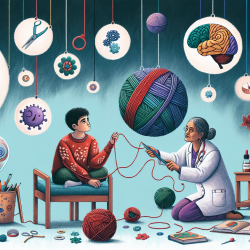Introduction
The COVID-19 pandemic has had far-reaching impacts across all sectors, with academic medicine being no exception. The research article, "The glass ceiling thickens: the impact of COVID-19 on academic medicine faculty in the United States," provides a data-driven analysis of how the pandemic has exacerbated existing inequities, particularly affecting women and early-career faculty. This blog aims to highlight key findings from the study and suggest actionable steps practitioners can take to improve their skills and advocate for systemic changes.
Key Findings
The study revealed several critical insights:
- Gender Disparities: Women faculty were disproportionately affected, with 70% being responsible for caregiving, which negatively impacted their productivity in research, teaching, and clinical practice.
- Mental Health: The pandemic exacerbated mental health issues, with women and early-career faculty reporting significant negative impacts on self-care and mental health.
- Career Advancement: Early-career women feared retribution for taking leaves or tenure clock extensions, impacting their career progression.
- Institutional Support: Five themes emerged as critical areas for institutional support: Flexible Expectations, Support, Mental Health, Compensation, and Communication.
Actionable Steps for Practitioners
Based on these findings, practitioners in academic medicine can take several steps to improve their skills and advocate for change:
- Engage in Self-Care: Prioritize mental health by accessing available resources and creating a work-life balance.
- Advocate for Institutional Change: Use the study's data to push for policies that support flexible work expectations, mental health resources, and fair compensation.
- Network and Collaborate: Build a support network with colleagues to share responsibilities and reduce the burden of increased workloads.
- Participate in Professional Development: Seek opportunities to enhance skills in remote teaching and clinical practice, adapting to the post-pandemic landscape.
Encouraging Further Research
While this study provides valuable insights, it also highlights the need for ongoing research to monitor the long-term effects of the pandemic on academic medicine faculty. Practitioners are encouraged to contribute to and engage with research initiatives that explore innovative solutions to these challenges.
Conclusion
The pandemic has undoubtedly thickened the glass ceiling in academic medicine, but it also presents an opportunity for transformation. By leveraging data-driven insights and advocating for systemic changes, practitioners can help create a more equitable and supportive environment for all faculty members.
To read the original research paper, please follow this link: The glass ceiling thickens: the impact of COVID-19 on academic medicine faculty in the United States.










